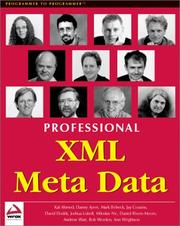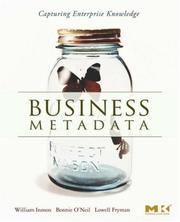| Listing 1 - 10 of 121 | << page >> |
Sort by
|
Book
ISBN: 150447371X Year: 2020 Publisher: New York, New York : IEEE,
Abstract | Keywords | Export | Availability | Bookmark
 Loading...
Loading...Choose an application
- Reference Manager
- EndNote
- RefWorks (Direct export to RefWorks)
A conceptual data schema that defines the structure of a metadata instance for a learning object is specified in this standard. For this standard, a learning object is defined as any entity, digital or non-digital, that is used for learning, education, or training; a metadata instance for a learning object describes relevant characteristics of the learning object to which it applies. Such characteristics can be regrouped in general, life cycle, meta-metadata, educational, technical, educational, rights, relation, annotation, and classification categories. The conceptual data schema defined in this standard specifies the data elements of which a metadata instance for a learning object is composed and allows for linguistic diversity of both learning objects and the metadata instances that describe them. It is intended that this standard will be referenced by other standards that will define the implementation descriptions of the data schema, so that a metadata instance for a learning object can be used by a learning technology system to manage, locate, evaluate, or exchange learning objects. The intent of this standard is to specify a base schema, which can be used to build on as practice develops, for instance in order to facilitate automatic, adaptive scheduling of learning objects by software agents.
Book
ISBN: 1783305886 9781783305889 Year: 2022 Publisher: London : Facet Publishing,
Abstract | Keywords | Export | Availability | Bookmark
 Loading...
Loading...Choose an application
- Reference Manager
- EndNote
- RefWorks (Direct export to RefWorks)
Book
ISBN: 1504470591 9781504470599 Year: 2020 Publisher: IEEE
Abstract | Keywords | Export | Availability | Bookmark
 Loading...
Loading...Choose an application
- Reference Manager
- EndNote
- RefWorks (Direct export to RefWorks)
A conceptual data schema that defines the structure of a metadata instance for a learning object is specified in this standard. For this standard, a learning object is defined as any entity, digital or non-digital, that is used for learning, education, or training; a metadata instance for a learning object describes relevant characteristics of the learning object to which it applies. Such characteristics can be regrouped in general, life cycle, meta-metadata, educational, technical, educational, rights, relation, annotation, and classification categories. The conceptual data schema defined in this standard specifies the data elements of which a metadata instance for a learning object is composed and allows for linguistic diversity of both learning objects and the metadata instances that describe them. It is intended that this standard will be referenced by other standards that will define the implementation descriptions of the data schema, so that a metadata instance for a learning object can be used by a learning technology system to manage, locate, evaluate, or exchange learning objects. The intent of this standard is to specify a base schema, which can be used to build on as practice develops, for instance in order to facilitate automatic, adaptive scheduling of learning objects by software agents.
Metadata --- Metadata. --- Standards.
Book
ISBN: 9783940344496 3940344494 Year: 2008 Publisher: Universitätsverlag Göttingen
Abstract | Keywords | Export | Availability | Bookmark
 Loading...
Loading...Choose an application
- Reference Manager
- EndNote
- RefWorks (Direct export to RefWorks)
Metadata is a key aspect of our evolving infrastructure for information management, social computing, and scientific collaboration. DC-2008 will focus on metadata challenges, solutions, and innovation in initiatives and activities underlying semantic and social applications. Metadata is part of the fabric of social computing, which includes the use of wikis, blogs, and tagging for collaboration and participation. Metadata also underlies the development of semantic applications, and the Semantic Web the representation and integration of multimedia knowledge structures on the basis of semantic models. These two trends flow together in applications such as Wikipedia, where authors collectively create structured information that can be extracted and used to enhance access to and use of information sources. Recent discussion has focused on how existing bibliographic standards can be expressed as Semantic Web vocabularies to facilitate the ingration of library and cultural heritage data with other types of data. Harnessing the efforts of content providers and end-users to link, tag, edit, and describe their information in interoperable ways (ʺparticipatory metadataʺ) is a key step towards providing knowledge environments that are scalable, self-correcting, and evolvable. DC-2008 will explore conceptual and practical issues in the development and deployment of semantic and social applications to meet the needs of specific communities of practice.
Dublin Core --- Metadata --- Congresses.
Book
ISBN: 9781501344275 1501344277 Year: 2020 Publisher: New York, N.Y.: Bloomsbury academic,
Abstract | Keywords | Export | Availability | Bookmark
 Loading...
Loading...Choose an application
- Reference Manager
- EndNote
- RefWorks (Direct export to RefWorks)
Hashtags (Metadata) --- Social media --- Hashtags (Metadata). --- Social media.

ISBN: 1861004516 Year: 2001 Publisher: Birmingham : Wrox press,
Abstract | Keywords | Export | Availability | Bookmark
 Loading...
Loading...Choose an application
- Reference Manager
- EndNote
- RefWorks (Direct export to RefWorks)

ISBN: 9781591582809 Year: 2007 Publisher: Westport (Conn.) : Libraries Unlimited,
Abstract | Keywords | Export | Availability | Bookmark
 Loading...
Loading...Choose an application
- Reference Manager
- EndNote
- RefWorks (Direct export to RefWorks)
Book
ISBN: 9781474292368 1474292364 9781474292375 1474292372 1474292348 147429233X 1474292356 Year: 2018 Publisher: London: Bloomsbury academic,
Abstract | Keywords | Export | Availability | Bookmark
 Loading...
Loading...Choose an application
- Reference Manager
- EndNote
- RefWorks (Direct export to RefWorks)
Metadata such as the hashtag is an important dimension of social media communication. Despite its important role in practices such as curating, tagging, and searching content, there has been little research into how meanings are made with social metadata. This book considers how hashtags have expanded their reach from an information-locating resource to an interpersonal resource for coordinating social relationships and expressing solidarity, affinity, and affiliation. It adopts a social semiotic perspective to investigate the communicative functions of hashtags in relation to both language and images. This book is a follow up to Zappavigna's 2012 model of ambient affiliation, providing an extended analytical framework for exploring how affiliation occurs, bond by bond, in online discourse. It focuses in particular on the communing function of hashtags in metacommentary and ridicule, using recent Twitter discourse about US President Donald Trump as a case study. It is essential reading for researchers as well as undergraduates studying social media on any academic course.
Hashtags (Metadata). --- Social media. --- Hashtags (Metadata) --- Social media --- Metadata --- User-generated media --- Communication --- User-generated content
Book
ISBN: 0738132977 0738132985 Year: 2002 Publisher: New York : IEEE,
Abstract | Keywords | Export | Availability | Bookmark
 Loading...
Loading...Choose an application
- Reference Manager
- EndNote
- RefWorks (Direct export to RefWorks)
"A conceptual data scheme that defines the structure of metadata for a learning object is specified in this standard.".
Metadata --- Data about data --- Meta-data --- Information organization --- Standards. --- Metadata. --- Metadata harvesting.

ISBN: 9780123737267 0123737265 9780080552200 008055220X 1281046574 9781281046574 9786611046576 6611046577 Year: 2008 Publisher: Amsterdam ; Boston : Elsevier/Morgan Kaufmann,
Abstract | Keywords | Export | Availability | Bookmark
 Loading...
Loading...Choose an application
- Reference Manager
- EndNote
- RefWorks (Direct export to RefWorks)
People have a hard time communicating, and also have a hard time finding business knowledge in the environment. With the sophistication of search technologies like Google, business people expect to be able to get their questions answered about the business just like you can do an internet search. The truth is, knowledge management is primitive today, and it is due to the fact that we have poor business metadata management. This book is about all the groundwork necessary for IT to really support the business properly. By providing not just data, but the context behind the data. For th
Database management. --- Metadata. --- Management information systems.
| Listing 1 - 10 of 121 | << page >> |
Sort by
|

 Search
Search Feedback
Feedback About UniCat
About UniCat  Help
Help News
News